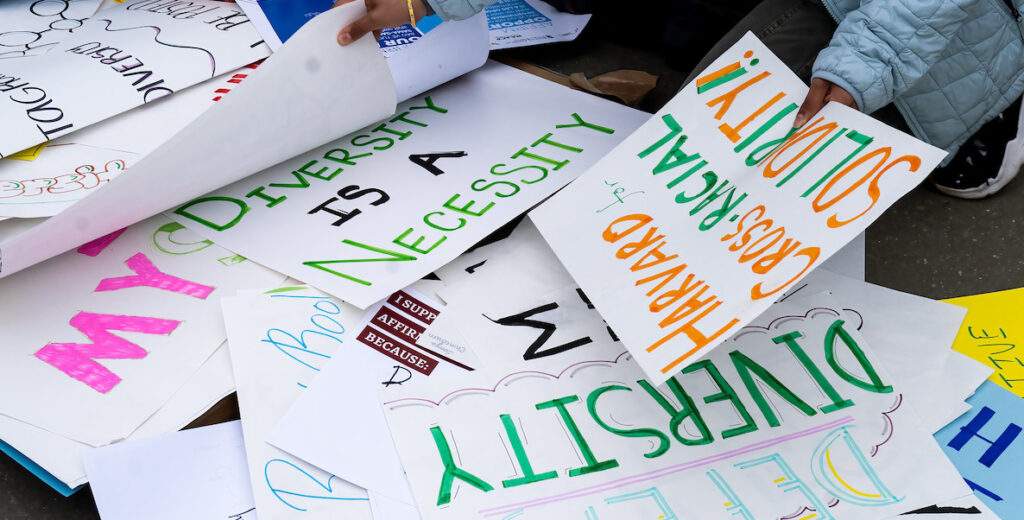Last week David Stone, senior advisor to the President of Columbia University, predicted in The Citizen that the Supreme Court would “officially reverse, or effectively undermine the constitutionality of affirmative action to achieve racial diversity in colleges and universities.” Yesterday, exactly one week later, Chief Justice Roberts wrote the decision for the majority (also: Thomas, Alito, Gorsuch, Kavanaugh, Coney Barrett) pretty much annihilating racial consideration in college admission.
Justice Sotomayor read the dissent she co-authored with Justice Kagan.”The Court stands in the way and rolls back decades of precedent and momentous progress,” she read, and “cements a superficial rule of colorblindness as a constitutional principle in an endemically segregated society where race has always mattered and continues to matter.”
It’s interesting to note that Chief Justice Roberts, in a footnote to the decision, exempts military academies from the ruling because, “It would be bad for military discipline and cohesiveness if the leadership cadre did not reflect the diversity of the rank-and-file troops who do the bulk of fighting and dying in wars.” Justice Jackson commented on the awkwardness of this footnote, protecting racial diversity “in the bunker, not the boardroom.”
David Stone was not alone in anticipating the Supreme Court’s heartbreaking decision, which will place prodigious obstacles to diversity at the Philadelphia area’s highly selective institutions (Penn, Haverford, Swarthmore, Bryn Mawr, and a few others). The decision will also challenge special financial aid assistance for Black and Latinos at all colleges and universities.
Justice Roberts gives admission offices some small leeway in considering students’ essays: “Nothing prohibits universities from considering an applicant’s discussion of how race affected the applicant’s life, so long as that discussion is concretely tied to a quality of character or unique ability that the particular applicant can contribute to the university.”
While it’s not entirely clear what Justice Roberts means in his “so-long-as” clause, it still seems permissible for students to discuss overcoming racial challenges and include personal statements that define the applicant’s character in terms of confronting racial issues.
How Philadelphia colleges and universities can promote diversity without breaking the law
-
- Partner in new and comprehensive ways with Philadelphia high schools — not just the magnet schools — but the neighborhood schools. Develop programs starting in the ninth grade or earlier for college preparation. Develop summer internships for students who might otherwise never consider the elite institution in their backyard.
- Partner with the Community College of Philadelphia in developing culture-changing pathways from community college associate degrees to elite university graduation. Large numbers of Black and Latino students begin college study at community colleges and aspire to transfer to universities for a bachelor’s degree. Few achieve that goal. Elite universities should invest — and that means money! — in cross-institutional advising, clear communication, and guaranteed scholarship support.
What Philadelphia citizens can do
-
- Mentor Black and Latino high school students. Encourage application to elite institutions and inform them that at lower income levels all costs will be covered without the necessity of loans.
- Encourage selective colleges and universities to invest in outreach to Philadelphia public schools and back up that encouragement with philanthropic donations.
Be aware when you vote in the next Presidential election that the President’s potential appointment of Supreme Court justices may be more important than any other issue in your decision-making. Because of Trump’s Supreme Court appointments, the 50-year protection of reproductive health has been struck down and now 50 years of racial progress has been compromised.
Despite their flaws, U. S. colleges and universities have long been bulwarks of democracy. Now is the time to develop creative approaches to maintaining opportunities for our nation’s diverse population.
Elaine Maimon, Ph.D., is an Advisor at the American Council on Education. She is the author of Leading Academic Change: Vision, Strategy, Transformation. Her long career in higher education has encompassed top executive positions at public universities as well as distinction as a scholar in rhetoric/composition. Her co-authored book, Writing In The Arts and Sciences, has been designated as a landmark text. She is a Distinguished Fellow of the Association for Writing Across the Curriculum. Follow @epmaimon on Twitter

